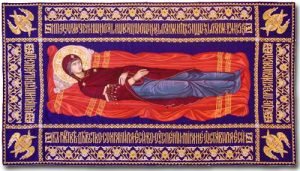 In the last issue I began to share thoughts about the establishment of the feast of the Dormition of the Mother of God (Assumption in the Western Church). As I indicated, the feast was established because the Church was fighting Nestorianism.
In the last issue I began to share thoughts about the establishment of the feast of the Dormition of the Mother of God (Assumption in the Western Church). As I indicated, the feast was established because the Church was fighting Nestorianism.
Relations between the Nestorians and the rest of the Empire were not good. In 486 the Christian Church in Persia officially pronounced itself to be Nestorian, in 489 the Nestorians were expelled from Edessa. Conflict between Nestorianism and the those who held an orthodox faith, continued during the entire sixth century. By this time the new heresy was tolerated to such a degree in Persia that even the ruler Kavadh II was rumored to be a Nestorian Christian. Some time during the reign of the Emperor Maurice (582-602), the Feast of the Dormition was established throughout the Empire on the date of August 15th. Maurice had had one war with Persia and was threatened soon after that with another. It seems likely that, with his record of religious persecution and practice of enforcing Chalcedonian Faith in the Eastern regions of his empire, the Emperor decreed the Feast of the Dormition as part of an anti-Nestorian policy to bolster religious and political unity in the face of the Persian threat. The fact that this feast, like the one before it, was established by imperial decree demonstrates that the institution of a liturgical feast was a recognized and effective method of promulgating a particular doctrine. And this practice was not limited to the portion of the Church that upheld the decrees of Chalcedon. One author points out that during the sixth century some churches kept older Marian feasts celebrated at various times of the year rather than the new one on August 15th. This same author rather mistakenly suggests that Maurice instituted the Dormition to end this diversity of observance. It was not the diversity of observance to which Maurice objected, however, but the diversity of intention. The older feasts commemorated the role of the Virgin in a manner which did not acknowledge her as Theotokos. In fact, Maurice was suppressing what he must have felt to be heterodox festal practice.
One thing is important to point out. The Church developed feasts as a result of reinforcing doctrines that were established by various Councils and emperors established them, many times, to bring political order to the empire. All the feasts were established, however, to somehow help Christians understand more clearly the doctrines that the Church saw as truth.
